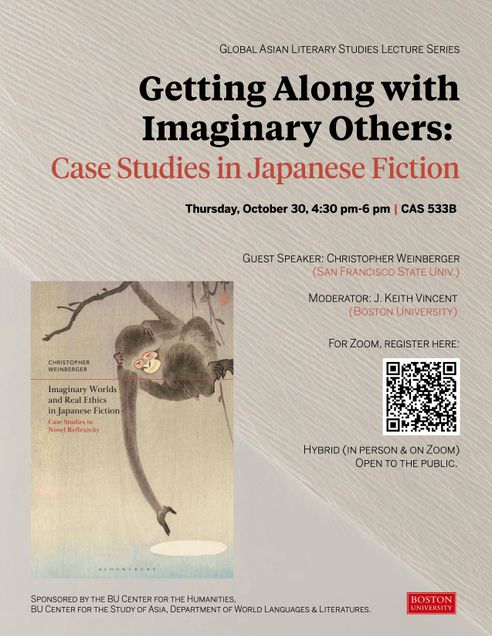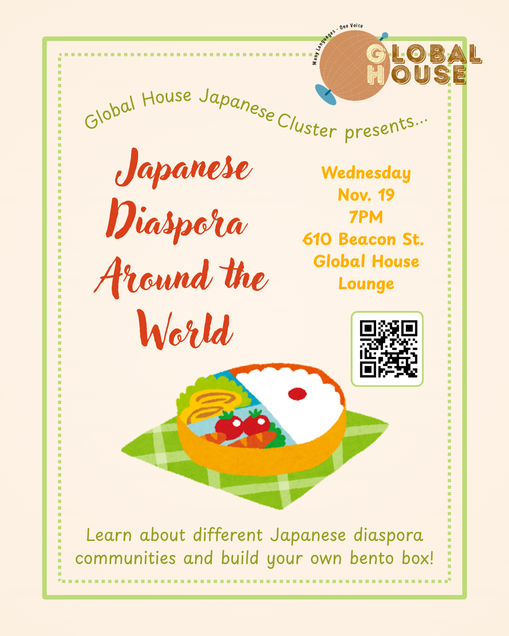This is a partial list of eligible Japan-related events.
Please check often – This page is constantly updated!
Please ask your instructor if what you find online counts for your Language Beyond the Classroom (Culture Pass)!
Please also visit our Virtual Culture Pass page and find Japan-related talks.
Recurring Events (in person)
Japanese Program Coffee Hour
Date: Friday on 9/19, 10/10, 10/24, 11/14, 11/21, and 12/5
Time: 1:25-2:15 pm
Place: STH B24

Nihongo Social
Date: Monday on 10/20 and 11/17
Time: 4:30-5:20 pm
Place: CAS 316
Please sign up from the QR code.

Cultural & Innovative Fridays by Consulate-General of Japan in Boston
Consulate-General of Japan in Boston organizes cultural event series on Fridays. Please check their website for the most updated calendar.
Recurring Events (online)
One-time Events (in person)
11/19 (Wednesday), Japanese Diaspora Around the World by Global House Japanese Cluster
11/8 (Saturday), The Devil Takes Bitcoin: Uncovering the Intersection of Japan, Crime, and Cryptocurrency by Japan Society of Boston
Saturday, November 8, 3 pm – 4:45 pm @Rajen Kilachand Center (610 Commonwealth Ave.)
Join us in welcoming Jake Adelstein, bestselling author of Tokyo Vice, for an inside look at his thrilling newest book, The Devil Takes Bitcoin: Cryptocurrency Crimes and the Japanese Connection. In conversation with Boston University’s Professor William Grimes, Jake will dive into the mysterious cryptocurrency heist and his experience as an investigative journalist in Tokyo, including opportunities for audience Q&A. There will be a book signing after the talk – guests can purchase copies of The Devil Takes Bitcoin at the event or bring copies of Jake’s books from home.
3:00pm – Author talk / 4:00pm – Book signing
$18 General Admission / $8 for JSB members / Free for BU students*
*BU students must show valid BU student ID at the door
Register here.

10/30 (Thursday), Getting Along with Imaginary Others: Case Studies in Japanese Fiction by Global Asian Literary Studies Lecture Series

Thursday, October 30, 4:30 – 6 pm@CAS 533B (Geddes Language Center)
Guest Speaker: Prof. Christopher Weinberger (San Francisco State University)
Moderator: Prof. J. Keith Vincent (Boston University)
This is a hybrid event (in person & on Zoom).
For Zoom, register here.
One-time Events (online)
11/13 (Thursday), Onigiri: A Cultural Encounter by Japan Foundation Los Angeles
Thursday, November 13, 7:00 – 8:15 pm (PDT)
Online Lecture: Onigiri: A Cultural Encounter by Dr. Gavin H. Whitelaw

Gavin H. Whitelaw is Executive Director of the Edwin O. Reischauer Institute of Japanese Studies. Dr. Whitelaw received his Ph.D. in Sociocultural Anthropology from Yale University and has spent over a decade living and teaching in Japan. Prior to joining the Reischauer Institute in 2016, he was Senior Associate Professor of Anthropology and Japan Studies at International Christian University (ICU) in Tokyo for eight years. His research and writing on contemporary commerce, work life, foodways, and Japan’s material culture have been supported by Fulbright and MEXT grants and appear in numerous edited volumes and peer-reviewed journals. Dr. Whitelaw teaches on the anthropology of food through Harvard’s Division of Continuing Education and has held visiting appointments at Colorado College, Boston University, and Waseda University.
Drawing on his research and firsthand experiences in Japan, Dr. Whitelaw will discuss how the onigiri—a staple of Japanese convenience stores (konbini)—reflects the country’s evolving social and cultural landscape. His talk will also examine the globalization of Japanese cuisine, as well as the challenges and tensions embodied in Japan’s most iconic fast food.
Debra Samuels from Table For Two USA will be demonstrating making onigiri at the end of the program.
Register here.
10/24 (Friday), Yokai Architecture by Japan Foundation Los Angeles
Friday, October 24, 7:00 pm – 8:30 pm (PDT)
Online Lecture: YOKAI Architecture by Naoyuki Kunikiyo

Architect Naoyuki Kunikiyo, a senior designer at Sou Fujimoto Architects who led the overall masterplan design of the EXPO 2025 Osaka-Kansai Expo, will deliver this lecture on architecture that transcends human presence through the lens of yokai—the supernatural monsters that have long been intertwined with everyday life in Japan.
In his graduate research, Kunikiyo not only explored the architectural spaces where yokai might dwell, but also designed the yokai themselves. Since yokai are believed to emerge from places of mystery, they remain inseparable from architectural space. While many have been passed down in stories since before the Edo period, Kunikiyo imagines that they still persist in our contemporary cities. Walking through Tokyo, he reinterpreted their names, forms, and legends, envisioning new architectures where they might continue to exist.
Register here.
Recorded Events
Matsuyama celebrating the 120th anniversary of Shiki's death day
For advanced-level students, Prof. Vincent is one of the panelists
Masaoka Shiki was a Japanese poet who was born in Matsuyama in Ehime Prefecture.
The Shiki Museum hosted the special event which commemorating the 120th anniversary of his death.
Professor Vincent joined as a one of the panelist for this event.
Link:Video
Prof. Vincent Blog: Loofah Day
Yokai 101:Exploring the Thrill of Japanese Folklore
It’s August, and that means it’s Obon season and the perfect time to learn about Japanese folklore! Join us for a special program dedicated to yōkai, supernatural entities and spirits that appear in many Japanese tales. Yōkai play an important role in modern Japan, as they not only appear in folklore narratives told to children, but also feature in video games, manga, and anime. Yōkai have become increasingly popular in the U.S. with the spread of Japanese pop culture, like the video game series Yokai Watch.
Professor Michael Dylan Foster from UC Davis will be sharing his knowledge on the world of yōkai along with Matthew Meyer, a popular yōkai artist. This is a great opportunity to learn more about Japanese folklore, its traditional roots, and how both still play a role in Japan today!
世界でも数少ない日本研究のアメリカ人民俗学者 カリフォルニア大学デービス校のマイケル・ディラン・フォスター氏、そして、浮世絵調の自作イラストに英語の解説を付し日本の妖怪を世界に発信しているアーティスト、マット・マイヤー氏がアメリカでもじわじわと人気がでている日本の妖怪について語ります。
Speakers:
Michael Dylan Foster | Professor of Japanese & Chair of the Department of East Asian Languages and Cultures, University of California, Davis
Michael Dylan Foster is Professor of Japanese and Chair of the Department of East Asian Languages and Cultures at the University of California, Davis, where he teaches courses on Japanese folklore, heritage, tourism, and popular culture. He is the author of The Book of Yōkai: Mysterious Creatures of Japanese Folklore (2015), Pandemonium and Parade: Japanese Monsters and the Culture of Yōkai (2009), and numerous articles on Japanese folklore, literature, and media. He is also the co-editor of The Folkloresque: Reframing Folklore in a Popular Culture World (2016) and UNESCO on the Ground: Local Perspectives on Intangible Cultural Heritage (2015). His current project explores discourses of tourism and heritage as they relate to local festivals in Japan, and he recently co-edited Matsuri and Religion: Complexity, Continuity, and Creativity in Japanese Festivals (2021).
Matthew Meyer | Illustrator & Folklorist
Matthew Meyer is an illustrator and folklorist based in Japan. He received a BFA in illustration from Ringling College of Art and Design in 2005. His work is focused on Japanese folklore, particularly yokai studies. He is the author of The Night Parade of One Hundred Demons (2012), The Hour of Meeting Evil Spirits (2015), The Book of the Hakutaku (2018), and The Fox’s Wedding (2021). He is also the creator of yokai.com, an online illustrated database of Japanese ghosts and monsters. (Website/Patreon)
Link: Yokai 101
Japan's Changing Role in Asia: Opportunities and Challenges, hosted by Japan Society of Northern California
U.S.: February 8, 2021 @ 4:00 – 5:00 PM (U.S. Pacific Time)
Hear two experts share their views on Japan’s evolving role in Asia and what that means for the U.S. Hiroyuki Akita, commentator of the Nikkei Shimbun and former Washington correspondent, is one of Japan’s top analysts on foreign policy and the US-Japan relationship. Professor Thomas Berger, professor of international relations at the Pardee School of Global Studies at Boston University, is one of America’s top experts on Japanese foreign policy.
Please visit: https://www.usajapan.org/event/japan-changing-role-in-asia-opportunities-and-challenges/
Translation Now Conference
Click here to view recordings from the event.
Click here to view the full conference page.
Translation Now celebrated the fortieth anniversary of the Seminar by bringing to Boston some of the most distinguished translators and scholars in the field today. The conference began with a keynote address by Rosanna Warren, who gave the Seminar its current shape and taught it until 2012. Professor Warren’s keynote was followed by a series of moderated conversations on key issues in literary translation.
Haiku as World Literature Symposium: Celebrating Masaoka Shiki's 150th Birthday
Click here for the full event page with video recording.
Haiku is perhaps the best travelled of all world literary genres. Since the seventeenth century, when Matsuo Bashō wrote his masterpiece, The Narrow Road to the Deep North, haiku poets have embarked on countless figural and literal journeys, and they have taken the genre with them. By the eighteenth and nineteenth centuries, dense social networks of haiku poets crisscrossed the whole of Japan, and by the early twentieth century, haiku in its modern form had spread across the globe through the work of poets including Ezra Pound, Rabindrath Tagore, Frederico Garcia Lorca, and Yu Ping Bo. Today millions of people write haiku in Japanese and dozens of other languages.
This symposium marks the 150th anniversary of the birth of the haiku poet Masaoka Shiki (1867-1902). Despite spending the last seven years of his life immobilized by tuberculosis, Shiki contributed more than any other poet to the genre’s emergence as a globe-trotting literary form. Scholars and poets working on haiku in Japanese, English, Persian, Chinese, and Spanish shared their work on Shiki and on the poetics of haiku in its global dimensions.
Tale of Genji Symposium
Click here to see more information about this event, including conference recordings.
BU faculty from WLL, Art History, English, and Romance Studies joined together on November 5th, 2016 for an interdisciplinary symposium celebrating a new translation of on the world’s first novel written by a woman: Lady Murasaki’s 11th century Tale of Genj.
Translation Seminar
Visit here to find Japan-related talks!
http://www.bu.edu/translation/translation-seminar/archive-2/
MFA Lecture Series
Painting Edo: Japanese Art from the Feinberg Collection. Harvard Art Museums.
Painting Edo — the largest exhibition ever presented at the Harvard Art Museums — offers a window onto the supremely rich visual culture of Japan’s early modern era. Selected from the unparalleled collection of Robert S. and Betsy G. Feinberg, the more than 120 works in the exhibition connect visitors with a seminal moment in the history of Japan, as the country settled into an era of peace under the warrior government of the shoguns and opened its doors to greater engagement with the outside world. The dizzying array of artistic lineages and studios active during the Edo period (1615–1868) fueled an immense expansion of Japanese pictorial culture that reverberated not only at home, but subsequently in the history of painting in the West.
JFNY Literary Series
